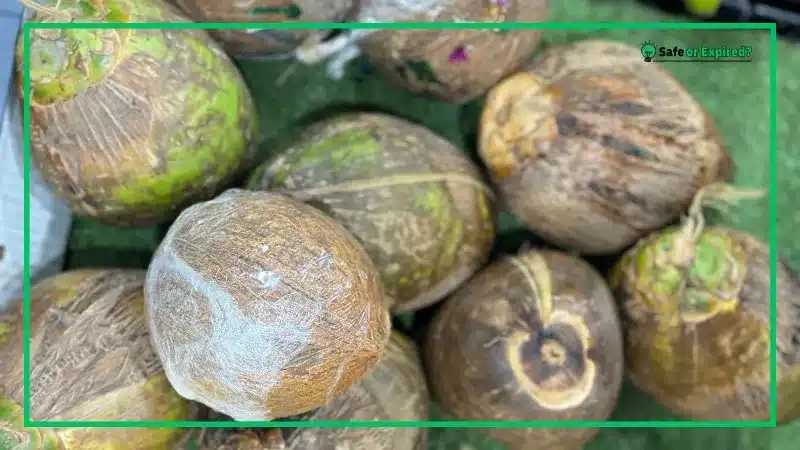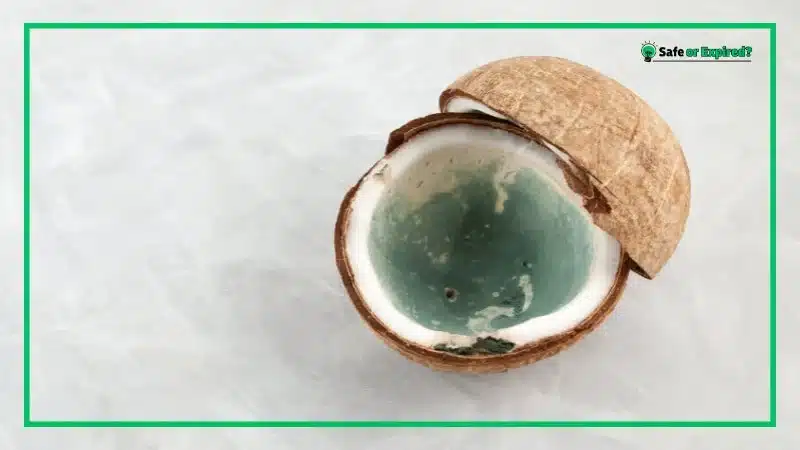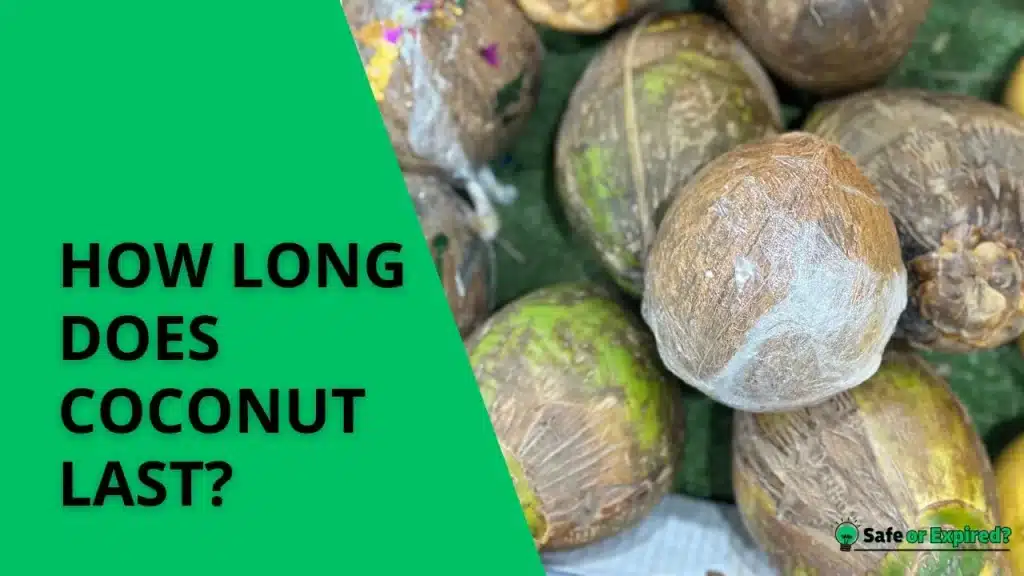“How long do coconuts last?” is a critical question that can be answered by understanding the signs of spoilage and storage conditions. The short answer is that coconuts last about two months in general, but their shelf life can vary.
Stick around to know how long coconuts stay good in different conditions and what are the best ways to keep them delicious for a long time.
Let’s begin.
How Long Does Coconuts Last ?
Coconuts generally last for about one to two months when stored at room temperature. If kept in a cool, dry place away from direct sunlight, their shelf life can extend slightly longer. Proper storage is key to maximizing the freshness and usability of coconuts.
How Long Does Coconuts Last Unopened?
Unopened coconuts can last up to six months if stored properly in a dry environment. Avoiding exposure to excessive heat and moisture is crucial to preserve extend their shelf life, allowing them to maintain freshness for longer periods.

How Long Does a Coconut Last Once Opened
Once opened, a coconut’s freshness decreases quickly. It should ideally be consumed within a week when stored in the refrigerator. Keeping the coconut in an airtight container or wrapping it tightly can help retain its moisture and prevent it from drying out or becoming rancid.
Here’s a simple table that outlines the shelf life of coconuts under various storage conditions:
| Storage Condition | Shelf Life |
| At Room Temperature | 1 to 2 months |
| In the Fridge (unopened) | 2 to 3 weeks |
| In the Fridge (opened) | 1 week |
| In the Freezer | Up to 6 months |
| In the Husk at Room Temperature | 2 to 3 months |
| In the Wild | 3 to 4 months |
| Off the Tree | 2 to 3 weeks |
| Young Coconuts | 1 to 2 weeks in the fridge |
Now, the details
How Long Do Coconuts Last in the Fridge?
When stored in the refrigerator, coconuts can last up to two to three weeks. It is important to keep them in their shell and wrap them tightly in plastic wrap or a sealed bag to maintain moisture and prevent them from absorbing other flavors from the fridge.”
How long can coconut cream last in the fridge
“Coconut cream can last in the fridge for up to 7 to 10 days if stored properly. Keep it in an airtight container to prevent contamination and preserve its freshness. Always smell and taste a small amount before use to ensure it hasn’t spoiled.
That’s all about how long does coconuts last in the refrigerator.
How Long Does Coconuts Last in the Freezer?
Coconuts can be stored in the freezer for up to six months, significantly extending their shelf life. Freezing coconuts is effective because it slows down the enzymatic activity that causes spoilage, keeping the coconut fresh and usable for an extended period.
How Long Does Coconuts Last at Room Temperature?
Coconuts last for approximately 1 to 2 months when stored at room temperature. Ideal conditions include a dry, cool place away from direct sun rays to maximize their shelf life.
At room temperature, coconuts can maintain their freshness for a couple of months if they are kept away from excess heat and humidity. The hard shell of the coconut provides natural protection against spoilage, but environmental factors can accelerate the degradation process. Storing them in a cool, dark place helps in preserving their quality by reducing the risk of the coconut meat turning rancid.
How Long Do Coconuts Last After Being Picked? the details
Freshly picked coconuts can last between 2 to 3 weeks at room temperature. Their longevity depends significantly on the initial freshness and handling post-harvest.

The shelf life of coconuts after being picked hinges on how they are handled immediately after harvesting. Coconuts that remain unhusked and intact generally retain moisture and are less susceptible to bacterial growth, helping them last longer. However, any damage to the husk or exposure to unfavorable conditions like high heat or moisture can drastically reduce their shelf life. Proper storage right after picking is crucial for maintaining their freshness.
How Long Does Coconuts Last in the Wild?
Coconuts can last for several months in the wild, often up to 3-4 months, depending on environmental conditions. The natural husk protects the inner fruit, allowing it to withstand varying weather conditions.
In the wild, coconuts are protected by their thick, fibrous husk, which acts as a shield against the elements and pests. This natural packaging helps the coconuts last longer by preventing moisture loss and providing insulation from temperature fluctuations.
The durability of coconuts in the wild also depends on whether they remain attached to the tree or fall to the ground, where they might be more exposed to dampness and pests.
How Long Do Coconuts Last Off the Tree?
Once detached from the tree, coconuts can last about 2 to 3 weeks at room (normal) temperature and even longer if stored properly in a cool, dry place. Once the coconut is removed from its natural environment, it begins to lose moisture, and the risk of the inner meat becoming dry or moldy increases without proper storage.
How Long Do Young Coconuts Last? the answer
Young coconuts last about 1 to 2 weeks when stored properly in the refrigerator. Their thinner husk makes them more susceptible to spoiling compared to mature coconuts. Young coconuts have a softer, greener husk and more water content, making them less resilient than mature coconuts.
So, young coconuts are best consumed quickly after purchase to enjoy their optimal freshness and nutritional benefits.
How Long Do Coconuts Last in Husk?
Coconuts in their husk can last up to 2-3 months when stored in a cool place. The husk serves as a natural barrier against moisture and pests, significantly extending the coconut’s freshness.
The husk of a coconut is designed by nature to protect the inner seed, enabling it to endure harsh conditions while waiting to germinate. This natural protection extends the shelf life of coconuts significantly when compared to de-husked ones. The husk prevents moisture from seeping in and deters spoilage by providing robust insulation against environmental changes.
How Long Does It Take for a Coconut Shell To Decompose
A coconut shell can take up to 5-6 years to fully decompose in a natural environment. This lengthy process is due to the tough, lignin-rich fibers of the shell, which resist decomposition.
Coconut shells are made of very tough fibers that are resistant to decay and breaking down. This durability is beneficial for the coconut as it travels long distances across oceans, but it also means that once settled, the shells do not decompose quickly.
Environmental conditions like humidity, soil composition, and microbial activity can influence the rate of decomposition, but generally, coconut shells are among the slower-degrading types of organic waste.
How Long Do Coconut Flakes Last After Opening
Once opened, coconut flakes can last up to 4-6 months if stored appropriately in an airtight container and kept in a dry place. Coconut flakes, being dried and shredded, have a relatively long shelf life compared to fresh coconut. However, once the package is opened, they are exposed to air and moisture.
How Long Can Coconut Milk Last Once Opened
Once opened, coconut milk lasts around 4 to 6 days. The reason coconut milk can spoil quickly is due to its high protein. Always remember that whether canned or in a carton, coconut milk is prone to bacterial growth once exposed to air.
This is because this milk provides a rich medium for bacteria, especially when kept at room temperature. Refrigeration slows down bacterial growth, but it should still be used within a few days to ensure safety and quality. If the coconut milk smells sour or the texture changes significantly, it should be discarded.
How to Know Coconuts Have Gone Bad?
To determine if a coconut has gone bad, check for a sour smell, mold growth, or a hollow sound when tapped. Additionally, inspect the water inside—if it tastes sour or soapy, the coconut is likely spoiled.
Sour Smell
If a coconut has gone bad, one of the first signs you’ll notice is a sour or foul smell. This odor is distinct from the sweet, slightly nutty fragrance of fresh coconut. When coconuts spoil, bacteria and mold can grow, producing gases and other byproducts that give off an unpleasant smell.
If you crack open a coconut and are greeted by a sour or off odor instead of a fresh scent, it’s best to discard it. This simple sniff test is effective and can prevent you from consuming spoiled food.
Mold Growth
Mold on a coconut is a clear indicator that it should not be consumed. This mold might appear on the outer husk as green, white, or black spots. If the mold has penetrated inside the coconut, you will see it on the shell or the edible white part. Mold develops when coconuts are stored in warm, moist conditions.
Consuming moldy coconuts can be harmful to your health, as mold can produce toxins that are not safe to eat. Always check both the outside and inside for any signs of mold before using a coconut.
Hollow Sound When Tapped
A fresh coconut will have a full sound when tapped because it should still contain water. If a coconut sounds hollow when you tap it, it could mean the water inside has leaked out or evaporated, which is a sign of age and potential spoilage. A hollow sound can indicate that the coconut’s shell has been compromised, allowing bacteria to enter and spoil the contents.
It’s a good idea to shake the coconut and listen for the sloshing of water inside; no sound or dull sound suggests the coconut is no longer good.
Sour or Soapy Taste of Coconut Water
The water inside a fresh coconut should taste sweet and refreshing with a slight nuttiness. If the water tastes sour or soapy, it is a sign that the coconut is spoiled. These tastes develop due to bacterial action inside the coconut, which breaks down the sugars and ferments the liquid.

Drinking spoiled coconut water can lead to stomach discomfort or food poisoning. Always taste a small amount of the coconut water before consuming the rest or using it in recipes to ensure it is safe and pleasant to drink.
‘Also, note that proper food handling is crucial for your health. Check out “Guidelines for Safe Food Handling.“
What Will Happen If You Eat Bad Coconut?
Eating spoiled coconut can lead to several health issues, primarily related to food poisoning. Here are some potential symptoms and consequences of consuming bad coconut:
Stomach Upset
One of the most common reactions to eating spoiled coconut is stomach upset. This can include symptoms like nausea and diarrhea. These symptoms occur because your body is trying to expel toxins produced by bacteria that have grown on the coconut. If you experience mild symptoms, they typically resolve on their own with rest and hydration.
Vomiting
Vomiting is another defense mechanism your body uses to rid itself of harmful substances. If you consume bad coconut, your body might react by vomiting to eliminate the toxins. While unpleasant, this is usually a short-lived response, but it can lead to dehydration if fluids are not adequately replaced.
Food Poisoning
More severe cases of consuming spoiled coconut can result in food poisoning. Symptoms of food poisoning can include the above-mentioned stomach upset and vomiting, but also fever, headache, and general malaise. Food poisoning can vary in severity; while most people recover without needing medical attention, it can be more serious and require hydration and medication in some cases.
Dehydration
Dehydration is another risk if you eat bad coconut. Signs include dry mouth, dizziness, and feeling unusually thirsty. It’s important to drink plenty of fluids and, in some cases, solutions that restore electrolyte balance to treat dehydration.
Allergic Reactions
While not directly caused by the coconut being spoiled, some individuals might have an allergic reaction to coconut. Symptoms include itching, hives, swelling, and, in severe cases, anaphylaxis—a potentially life-threatening condition that requires immediate medical attention.
Understanding what makes food go bad helps you prevent it. Learn more in “Top Causes of Food Spoilage.”
What Are the Best Ways to Extend a Coconut’s Shelf Life?
To extend a coconut’s shelf life, store it in a cool place. For whole coconuts, refrigeration can prolong freshness up to two months, while freezing the meat preserves it for six months. Keep coconut water in the fridge and consume within a week for optimal freshness.
To extend a coconut’s shelf life, store it in a cool, dry place, keep it in its husk, and refrigerate or freeze it if not used immediately. Proper storage conditions significantly delay spoilage and maintain freshness for longer periods.”
Store in a Cool, Dry Place
Keeping coconuts in a cool, dry environment maintains its quality. Avoid areas like a sunny windowsill or a damp basement. A pantry or a cupboard is perfect for storing coconuts at room temperature. Remember that the right storage methods can greatly extend your food’s life. Find more practical advice in “Food Storage Tips for Optimal Freshness.”
Keep Coconut in Its Husk
The natural husk of a coconut provides excellent protection against environmental factors. If possible, purchase coconuts that still have their husk and only remove them when ready to use. The husk helps to retain moisture within the coconut and acts as a barrier against physical damage or contamination. This simple practice can extend the coconut’s freshness by weeks or even months when combined with other proper storage methods.
Refrigerate for Short-Term Storage
If you plan to use the coconut within a few weeks, refrigeration is an effective way to extend its shelf life. Once the coconut is opened, place any unused portion in an airtight container. The cooler temperatures in a refrigerator can slow down the processes that cause the coconut to spoil, such as microbial growth and enzymatic activity.
Freeze for Long-Term Storage
For long-term preservation, freezing is your best option. Coconuts can be frozen whole, or the meat can be removed and stored in freezer-safe bags or containers. Freezing stops the growth of microbes that cause spoilage and practically halts the enzymatic processes that can degrade the coconut over time. When you’re ready to use the coconut, allow it to thaw in the refrigerator overnight.
Each of these storage methods helps to preserve the coconut’s quality and extend its usability. Whether you choose to refrigerate, freeze, or store it at room temperature, proper handling is key to maintaining a coconut’s freshness.
Many beliefs about food preservation are incorrect. Discover the facts in “Debunking Common Food Preservation Myths.”
Conclusion
By understanding the factors that affect a coconut’s longevity and following these storage tips, you can greatly extend the freshness of your coconuts. Here are the key takeaways:
- Coconuts can last 1 to 2 months at room temperature if stored properly in a cool, dry place.
- Refrigerating coconuts can extend their freshness up to three weeks, especially once opened.
- Freezing coconuts is ideal for long-term storage, preserving their quality for up to six months.
- Keeping coconuts in their husk and avoiding damp storage areas are crucial for preventing spoilage.
- Regularly checking for spoilage signs can help you use coconuts before they go bad.
Implementing these strategies will ensure that you get the most out of your coconuts, enjoying their fresh taste and nutritional benefits for longer periods.

